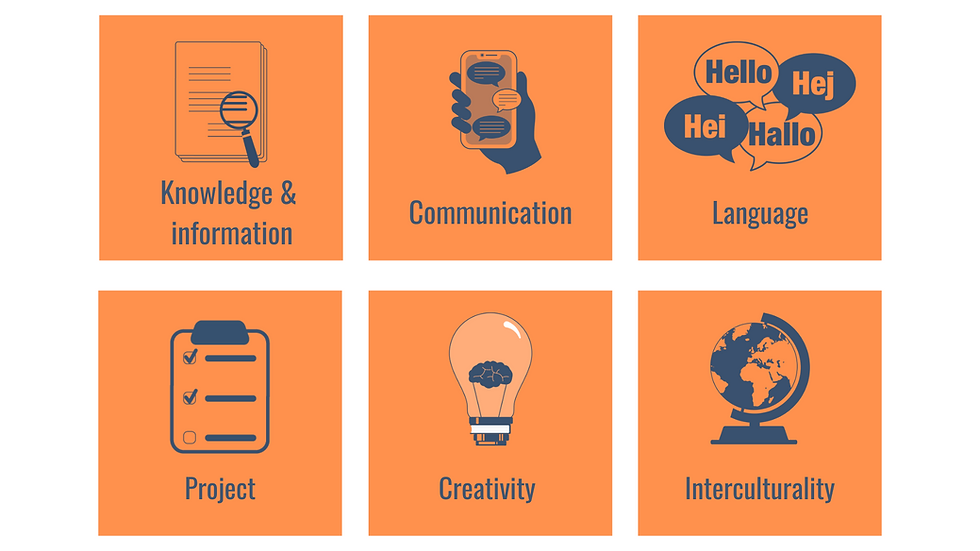Your questions on the employment of humanities graduates answered
- Catho Jacobs

- Nov 22, 2022
- 4 min read
Updated: Aug 15, 2023
We asked university teaching staff to send us their questions on the labour market and career paths taken by humanities graduates. A total of 90 teachers from the three ASSET-H partner universities responded to our call. It is clear that the subject interests members of the teaching community as we received 245 questions related to the placement of their students in working life. In this blog post, the ASSET-H research team address the four most frequently asked questions presented to us through the online survey.

Question 1: Which skills do students believe to be missing in the humanities curriculum?
In the ASSET-H project, we move away from the deficiency perspective that we too often see adopted by people outside of the humanities, and which is also sometimes adopted by teaching staff, researchers, and students in the humanities themselves. This deficiency perspective stems from a concern that humanities teaching staff is lacking when it comes to preparing their students for the demands of working life.
We argue that by adhering to this perspective, the intrinsic value that our disciplinary approaches have, is being underestimated and undervalued. We propose boosting humanities students’ employability from the inside, by revealing that the skills they need are already in place as part of their study programmes.
Put differently, we found out that 6 vital skills are already part of the programmes offered in the humanities. By participating in humanities programmes, students make themselves highly employable and ready to take on the challenges of working life in the modern world. By highlighting these inherent and valuable skills, the humanities teaching staff can adequately prepare our students for life outside the university.
The following skills clusters make humanities students stand out in their professional lives:


Are you interested in finding out more about these skills? See the ASSET-H skills profile for employability of humanities graduates.
Question 2: How can teaching staff help students strengthen their skills?
It is crucial that teaching staff are aware of the working life skills they teach students and that they know how to communicate about these skills while teaching. By explicitly talking about the skills your course targets during class, you enhance students’ awareness of their working life skills and increase their self-confidence about their added value in working life.
To help teaching staff reach this goal, the ASSET-H team has designed “H-Highlight”, which is a workshop for teaching staff to articulate humanities skills more explicitly in their course design. Importantly, we do not ask teaching staff to add additional or "generic" skills to their classes. Instead, we help them to better articulate exactly what skills they are already teaching through their disciplinary focus. Keep an eye on our website to find out when the next workshops take place.
Trainer Catho Jacobs has five tips for teachers interested in integrating skills information in their course design
In our previous post, co-developer of the H-Highlight workshop Catho Jacobs shares five tips for teaching staff who want to learn more about skills integration in their courses.
How to communicate about skills to your students
If you already know which skills you teach your students but are unsure about how to best communicate them to the students, watch our short video about skills communication. In this clip, you will get some practical tips and tricks on how to integrate communication about working life skills in your teaching.
Questions 3 & 4: What kinds of careers do our graduates have? Which skills do they use daily?
At this moment, we do not have the data to offer an extensive overview of the different jobs and careers a European humanities student could have. A quantitative overview that reaches across different institutions and national borders is outside of the scope of our project.
What we can do is give you some insights into the different positions our humanities graduates could have based on a qualitative study. Therefore, we included a page on our website titled career stories. On this page, you will find several stories of alumni who discuss their career and the skills they use daily in their work. Many of the humanities skills of the ASSET-H skills profile are discussed in these alumni stories. We thus argue that the skills profile of our students makes them versatile assets to various industries and workplaces. This page is updated often with new career stories, so feel free to consult it frequently.
Besides our page on career stories, we would also like to encourage teaching staff to start a conversation about the topic with their students, alumni, and colleagues. Gathering multiple perspectives and opinions on working life for humanities graduates will undoubtedly help teaching staff to get a clearer view of the different career options for humanities students.
Coming soon: in-depth answers from working life representatives and experts
Of course, we also received other interesting questions about students’ professional journeys from teaching staff. We are currently interviewing working life representatives and experts to gather in-depth and informed answers.
We have asked working life representatives and experts:
Which skills and competences do employers value most in recent university graduates?
How important are the skills from the ASSET-H skills profile in working life, according to employers and HR-professionals?
Is it an added value for humanities students to have multiple degrees or to do an internship?
What is the importance of lifelong learning in working life?
Keep an eye on our website in the coming weeks to find out the answers to these questions!
Photo by Veikko Somerpuro. Source: University of Helsinki.



Instead of endlessly browsing job boards, take a step back and understand yourself first. A free online career quiz is the perfect first step to a more focused and effective job search.